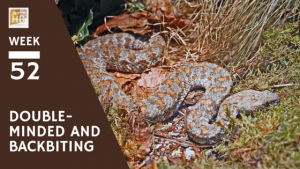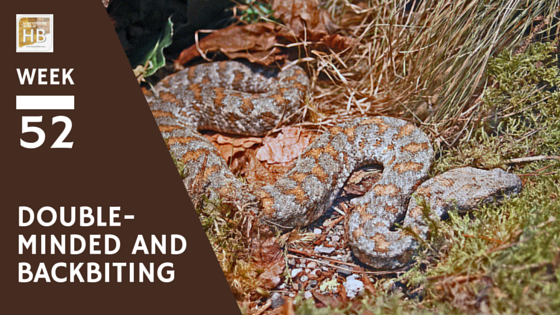Week 52 | Section 61
 Our reading today is one of three passages in the Harmony of the Gospels that render ink to the harsh saying of Jesus.
Our reading today is one of three passages in the Harmony of the Gospels that render ink to the harsh saying of Jesus.
In this instance, Jesus calls the pharisees “a brood of vipers” and challenges not only their logic but their motives and priorities.
This is a passage that many irenic Christians would rather skip over, however it provides disciples the opportunity to explore several important spiritual truths including: conflict, kingdom-mindedness, peace-keeping, discernment, admonishment, spiritual warfare, the day of judgement, and Christian virtue.
[one_half last=”no”]Scripture:
Matthew 12:22-37
22 Then one possessed by a demon, blind and mute, was brought to him1 and he healed him, so that the blind and mute man both spoke and saw.2 23 All the multitudes were amazed, and said, “Can this be the son of David?” 24 But when the Pharisees3 heard it, they said, “This man does not cast out demons, except by Beelzebul, the prince of the demons.”4¯5 25 Knowing their thoughts,6 Jesus said to them, “Every kingdom divided against itself is brought to desolation, and every city or house divided against itself will not stand. 26 If Satan casts out Satan, he is divided against himself. How then will his kingdom stand?7 27 If I by Beelzebul cast out demons, by whom do your children cast them out?8 Therefore they will be your judges. 28 But if I by the Spirit of God cast out demons, then God’s Kingdom has come upon you.9 29 Or how can one enter into the house of the strong man, and plunder his goods, unless he first bind the strong man? Then he will plunder his house. 30 “He who is not with me is against me, and he who doesn’t gather with me, scatters. 31 Therefore I tell you, every sin and blasphemy will be forgiven men, but the blasphemy against the Spirit will not be forgiven men. 32 Whoever speaks a word against the Son of Man, it will be forgiven him; but whoever speaks against10 the Holy Spirit, it will not be forgiven him, neither in this age, nor in that which is to come. 33 “Either make the tree good, and its fruit good, or make the tree corrupt, and its fruit corrupt; for the tree is known by its fruit. 34 You offspring of vipers,11¯12¯13 how can you, being evil, speak good things? For out of the abundance of the heart, the mouth speaks. 35 The good man out of his good treasure brings out good things, and the evil14 man out of his evil treasure brings out evil things.15 36 I tell you that every idle word that men speak, they will give account of it in the day of judgment.16 37 For by your words you will be justified, and by your words you will be condemned.”17¯18[/one_half][one_half last=”yes”]Scripture:
Mark 3:20-30
20 The multitude came together again, so that they could not so much as eat bread. 21 When his friends heard it, they went out to seize him: for they said, “He is insane.”
22 The scribes19 who came down20 from Jerusalem said, “He has Beelzebul,” and, “By the prince of the demons he casts out the demons.” 23 He summoned them, and said to them in parables, “How can Satan cast out Satan?21 24 If a kingdom is divided against itself, that kingdom cannot stand.22 25 If a house is divided against itself, that house cannot stand. 26 If Satan has risen up against himself, and is divided, he can’t stand, but has an end.
27 But no one can enter into the house of the strong man to plunder, unless he first binds the strong man; and then he will plunder his house. 28 Most certainly I tell you, all sins of the descendants of man23 will be forgiven, including their blasphemies with which they may blaspheme; 29 but whoever may blaspheme against the Holy Spirit never has forgiveness, but is subject to eternal condemnation.” 30 —because they said, “He has an unclean spirit.”[/one_half]
Group Dialog:
- How has fear caused you to react irrationally in the past?
- Talk about the difference between intuition and the spiritual gift of discernment.
- Have you ever felt the Lord admonish you? What lesson did you learn? How did your attitudes and actions change afterwards?
- Do we care more about church growth or our personal well-being or are we most concerned with advancing the Kingdom of God? What would it look like if we shifted our priorities in ministry to be the Kingdom of God?
- What is the fruit of your current ministry? If there is little, can you identify that you are in a season of ministry? Which one? What are you and the team doing then to pass through this season and prepare yourself for the fruit bearing season?
- How do you think we should deal with conflict, differences of opinion, or wrong teaching within your congregation, the Church, or your community?
Study Notes:
- The scripture does not make it clear if someone from the multitudes (Mt 12:23) brought the man to Jesus or if it was the pharisees (Mt. 12:14). It doesn’t matter much because the intent of the Gospelers appears to be to indicate the motives and agenda of this group of teachers of the law (Mk 3:22) which had already established been established (Mt 12:14-15).
- Isa 29:18; 35:5-6
- Who were the Scribes, Pharisees, Sanhedrin, and Sadducees?
- Often in human opposition is born by spiritual warfare. Eph 6:10-18.
- Notice how they did not question whether he had cast out the demons. Rather they sought to incite the crowd through sensationalist rhetoric with faulty logic which only further exposed their agenda and evil intent.
- Read Psalm 139:2, Mt 12:5, 14-15 discernment and foreknowledge
- Jesus confronts not only their logic but their motives which are the root of their baited accusation.
- Gal5:15
- If you see this then it stands to reason that the Kingdom of God has come. In other words I, Jesus, am the Messiah. In this he raises the reason for their fear, and the basis of their false logic. It might have been that they forgot the priority of their role as priests, and feared losing their position, as it would radically change if the Messiah has come.
- The pharisees were being double-minded, a term used only in James 1:6-8, which comes from the Greek word dipsuchos, meaning “a person with two minds or souls.” Such behavior is condemned (Ex 34:14) and is not the faith lauded in Hebrews 11:1-3.
- Read Isa 59:1-5
- Vipers are about 3-4′ in length, with a three-pronged head and designs on the back. The viper does not hide, but coils himself up and then raises up his head and hisses, as if to warn passers-by not to come near. In this situation, it is best to move away or keep a distance of about 3′ from the snake. Most importantly: never disturb a snake.
- There are three situations in which we can read harsh words from Jesus. Many would like to think that Jesus, meek and mild, would only offer words of consolation and encouragement. Jesus’ most harsh words to the pharisees include calling them: vipers, perverse, adulterous, hypocrites, fools, blind people, blind guides, whitewashed tombs, lawless, of their father the devil, and liars.
- The word for evil Poneros, indicates something physically or ethically bad, wrong, ill. There are consequential actions to our sins and evil deeds and thoughts.
- Jesus, with divine authority, is confronting the lack of fruit in their ministry.
- Jer 17:10
- Jer 17:10, Heb 4:13
- We also will be judged and our deeds will be winnowed. In part this is good news, as all that was impure will be turned to chaff and blown away. Col 1:13
- In Matthew the structure appears to point to pharisees mentioned in Matthew’s preceding verse (Mt 12:14, Section 52), but Mark specifies it was the “scribes” who came to investigate. The OT was preserved due to their dutiful service. During the time of the Jesus ministry the scribes were entrenched with the pharisees and were often members of the Sanhedrin. Their role (Ezra 7:6) was to interpret the more difficult and subtle questions of the law.
- This is a figure of speech. Jerusalem is south of Galilee, but when most often this manner of speech refers to going to a place with a lower elevation.
- See how the scribes specifically recognized the name of a demon and the existence of the devil. They recognize that Jesus is casting our evil spirits.
- Those who believe and are disciples are members of the the Kingdom of God, and should behave as such. This calls for repentance and godly behavior, as well as realignment of our priorities for the Kingdom of God – and not our own success. 1John 5:19, Eph 1:16-2:7
- The pharisees were proud to be among the seed of Abraham, but their behavior – theirs and their progenitors were more like vipers scheming, deceitful, venomous, liars who fed on the fears of their flock.
